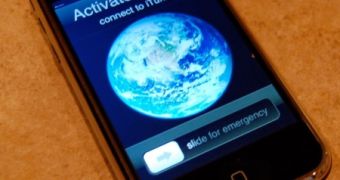Apple will start a race to prevent all SIM unlocks for the iPhone from now on. The company will rather look to make all the hacked devices impossible to use in any network rather than try to bring them back under the support of the original carrier.
The iPhone meant a considerably large expense, especially for early adopters. For those who have decided that AT&T does not best suit their telecom service needs, it meant an additional expense for unlocking the device. Now, Apple looks to break all their investments made up to this point for having a free mobile phone in any chosen network.
Steve Jobs, Apple's CEO, has announced, on the occasion of the UK iPhone unveiling, that they will fight by every possible means against the hacking trend which has taken great proportions over the last period. The company's stand in this matter differs, on account of the type of actions that hackers push. The company has no problem in the results of passionate developers that manage to pack more evolved performances in their iPhone. The true problem is that of SIM unlocking the device, although, at a first glance, it would seem that there are a few reasons for this to affect them.
Rumors state that the recently closed contract with O2 for the UK iPhone release also involves a 40 percent share from all the operator's revenues headed towards Apple. This means that the handset's producer should have all the interest in keeping its device within the selected networks, in order to benefit from the new iPhone owners' expenses.
Those who have chosen to unlock their handsets and escape the terms of AT&T's data plans have taken upon themselves the risk of ruining the device. If the hacking worked and they are now free of this operator's subscription, there is still one more problem to face. Once Apple starts releasing the next iPhone updates, there are high chances that the device will stop working if it is hacked.
That is exactly what the company plans on doing, with some harsh consequences too. Apple's intention goes nowhere close to reattaching the former subscribers back to the original network, but of destroying the device's software so that it can no longer be used. This is supposed to teach those owners a lesson and make the iPhone nothing more than a really expensive brick.

 14 DAY TRIAL //
14 DAY TRIAL //